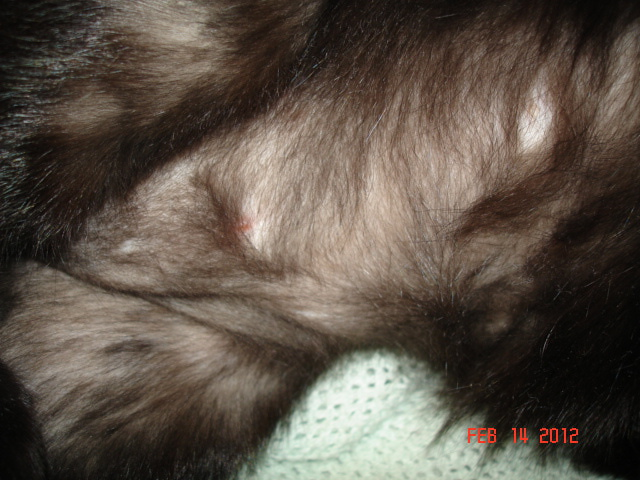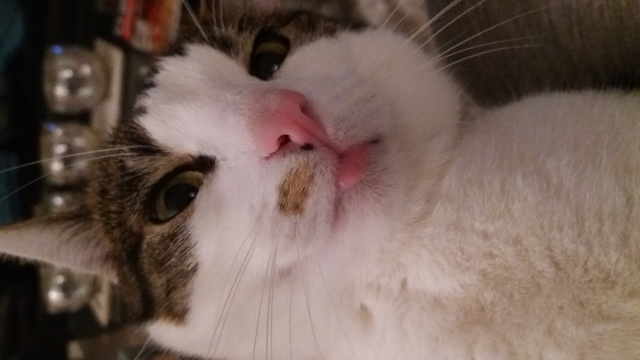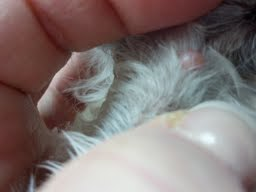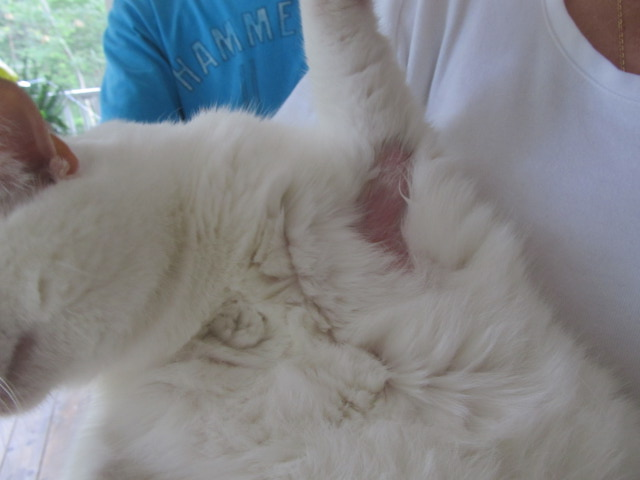QuestionI have found a 6 month old kitten I would love to bring home. Itook h to a
exam and to get his immunizations before bringing him home. He tested
positive for fIV but may have already been immunized. We've paid to have a
diagnostic test run at Auburn universrity to try to differentiate from the
presence of antibodies or the vaccination. We really want this cat anne would
love to know he's being properly cared for regardless of the results. My
concern is that we have a cat now that we don't want to Infect. Hoemw easily
is it transmitted?any suggestions?
AnswerI am not sure whether or not you typed FIV or FLV but either one is highly contagious and both are fatal if symptoms appear.
If the test shows that the antibodies are from being immunized (unlikely since you found him) then by all means bring him home.
However, if they are from an active titer in this cat- he will eventually succumb to this disease and your cat will very likely get it also.
It is transmitted (that they know of anyway) by sharing water bowls, mutual grooming, salival exchange (hissing into the air etc) fighting, breeding and blood. They have no idea how long the virus lives so once you have a cat in your house infected with it the virus has been shed around your house and it is now infected too.
Unless, like FELV, the virus only lives a few hours outside the cat.
While it has been heavily studied, not much really is known about it. (FIV) Feline Immunosuppressent Virus is usually the precursor to FELV infection and/or lymphosarcoma in cats. Here is the Merck Manual take on it:
Feline immunodeficiency virus (FIV, originally feline T-lymphotropic lentivirus) is a related lentivirus that has been identified in domestic cats and cheetahs. The infection is endemic in cats throughout the world. Virus is shed mainly in the saliva, and the principal mode of transmission is through bites. Free-roaming (feral and pet), male, and aged cats are at the greatest risk of infection. FIV infection is uncommon in closed purebred catteries. After infection, there is a transient period of fever, lymphadenopathy, and neutropenia. Most cats recover from this stage and appear normal for months or years before immunodeficiency occurs. The percentage of infected cats that enter the terminal phase of the illness is unknown. Cats with acquired immunodeficiency induced by FIV develop chronic secondary and opportunistic infections of the respiratory, GI (including mouth), and urinary tracts, as well as the skin. FIV-infected cats have a higher than expected incidence of FeLV-negative lymphomas, usually of the B-cell type, and myeloproliferative disorders (neoplasias and dysplasias). Of affected cats, ~5% have neurologic signs referable to cerebral cortex disease (behavioral abnormalities, psychomotor disturbances, dementia, convulsions). Cats remain infected for life; the presence of serum antibodies is directly correlated with the ability to isolate virus from blood cells and saliva.
So as you can see- you are risking a lot bringing this guy home.
I hope you can find an equatable and fair solution to this heart-rending problem.
Good luck and let me know what happens.

 Dull Fur & Flaky Skin
QuestionQUESTION: Can you give your cat the human Omega
Dull Fur & Flaky Skin
QuestionQUESTION: Can you give your cat the human Omega
 cats lip
Question
swollen lip
Hi there. I dont know if th
cats lip
Question
swollen lip
Hi there. I dont know if th
 Small growth my dogs face
Question
growth photo 2 growth photo 3
Hi.
Small growth my dogs face
Question
growth photo 2 growth photo 3
Hi.
 cat skin problem
Question
Clawdia
Hi, Thank you for answering my
cat skin problem
Question
Clawdia
Hi, Thank you for answering my
 regurgitation
QuestionMy Cat is 4, indoor, and quite small with short
regurgitation
QuestionMy Cat is 4, indoor, and quite small with short